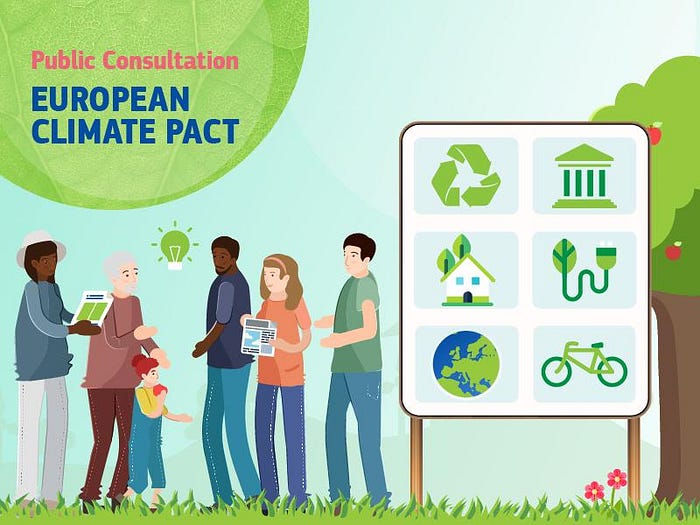What is radical collaboration and how could it help sustainable development?
“When people believe they can make a difference, they achieve remarkable things.”
But how do you make people believe they can make a difference? What makes me, you, or anyone else decide that today they’ll ditch the plastic bags, or change to a sustainable bank, or start sharing Instagram posts about climate activism?
Earlier this year, representatives from the European Commission, Oatly, and the International Festival for Social Collaboration gathered online to discuss this question: how do we get individuals actively involved in sustainable development?
Brought together by Think.Act.Change digital debates, a series of webinar discussions between people working in sustainability, organised by Brussels-based strategist Jo Sullivan and creative facilitator David Labi. The aim of these debates is “to share transformational insights, and speed change by bursting bubbles and building bridges, and making sure sustainability stays at the top of the political agenda,” as Sullivan describes.
She and Labi came up with the idea during the COVID-19 lockdown in Brussels: the impact of the pandemic had both highlighted the urgent need to rethink political priorities, and exposed the potential of digital tools to easily coordinate online debates with participants from across the world.
The diversity of the panel reflected the recurring message of the discussion: for meaningful change, you need to step outside your bubble and get radical. Radical collaboration, radical intersectionality, and a radical story to share with the world about the role we all play in tackling the climate crisis. But what does that actually mean?
Tina Zournatzi, European Commission Head of Unit for Strategic Communications, explained that at EU level, reaching the EU Green Deal objectives is dependent on citizen action. The Green Deal is an ambitious policy area that aims to make Europe the first carbon-neutral continent by 2050.
It’s no easy task, and as Zournatzi put it, “It means fundamentally transforming our lives and our economies, which is why it needs the participation of everyone: government, industries, consumers.” Because of this, one of the primary aims of the Green Deal communications strategy is to promote sustainable behaviour at a citizen level.
Elena Malinovská, European Head of Unit for Adaptation to Climate Change, Cities and International Cooperation echoed the importance of involving individuals in EU-wide policies. The Commission is creating a Climate Pact to support grassroots environmental movements and raise public awareness of these initiatives.

The Pact is co-created with citizens from the start through online consultations. “We hear that individual action is a drop in an ocean,” Malinovská says, “but when people believe they can make a difference, they achieve remarkable things.”
The FIIS movement, founded by Jonathan ‘Nony’ Herzfeld, is a fantastic example. FIIS is a global platform that seeks cultural transformation towards sustainable development through street action festivals. Before the FIIS team even knew about the Sustainable Development Goals or the work of the European Commission, they were driving radical collaboration. They would bring together local leaders, influential people and organisations in towns in Chile and hold events on the streets which aimed at collaborating to solve local challenges in the city.
When citizens are given the tools and the belief that their actions matter, the results can be dramatic. Cecilia McAleavey, Director of Sustainable Eating and Public Affairs at Swedish oat drink company Oatly, shared the company’s skyrocketing turnover: between 2018 and 2019, Oatly doubled their yearly revenue, reflecting a significant growth in demand. It’s not just for oat milk — she cited a predicted 28% annual growth in the demand for meat alternative products. People are choosing their products based on global impact, not just personal choices.
McAleavey is a strong supporter of consumer empowerment and backed the idea of a mandatory climate declaration on all products stating its environmental impact. The information on a product label should allow shoppers to buy according to their values and have transparency about the nutritional value and environmental impact of what they’re buying.
Such changes can be demanded by consumers, but of course require legislation to become common practice: the recently-proposed EU Farm to Fork Strategy includes a sustainable labelling system that will allow this transparency.
The phrase ‘radical collaboration’ could be a misnomer: it’s no recent revelation that collaboration is the key to significant success. Nony quoted the old proverb, ‘If you want to go fast you can go alone, but if you want to go far we should go together.’
But simply collaborating is not enough. Radical collaboration is about breaking out of comfort zones and the artificial separation of government policy, private businesses and individual lives. And most importantly, it’s about understanding that the green transformation cannot be treated as separate from other social and economic issues.
Radical collaboration is not radical without intersectionality. Marginalised social groups and low-income communities have the most to lose from the impacts of the climate crisis, but also often the least able to influence action to tackle it. “In Latin America, the consumer doesn’t have a choice [to buy sustainable products] because of the deep inequality,” said Nony.
Similarly, it is women who are most vulnerable to the impacts of the climate crisis worldwide, and it is also women who are most concerned with pro-environmental efforts. Without unpacking the intersections between climate justice, racial justice, economic justice and all the other deep-rooted inequalities and divisions in our societies, and ensuring that collaboration reaches those who most need a say, the collaboration isn’t radical.
Throughout the discussion, a growing consensus emerged that a green transformation needs involvement from people in all parts of society, but that involvement won’t happen unless people believe that they have a power to make a change. The need for citizen education of environmental issues and how our actions have an impact on the planet is more pressing than ever. Not only that, but we need coherence between what happens in the European Commission, in business practices, and in the corner shops of every city.
In the midst of a pandemic which upturned everything that was normal about our lives, there is a silver lining: the COVID chaos has shown that other ways of living are possible. Now that we are all responsible for rebuilding the post-corona world, we have an opportunity to build the world we want to see, not the one that created the problems that got us here.
There is no vaccine for the climate crisis, but there are millions of people with unique experiences and ideas who could invent radical solutions if they’re brought together. As the motto for FIIS goes — and particularly now in a non-traditional time, “we don’t have time to do things the traditional way.”
For more information about Think Act Change, please contact David at david@goodpointagency.com or Jo at Jo@conscienceconsult.net
— — — — — — — — — — — — — — — — — — — — — — — — — — — -
I write about climate action and sustainability. If you want to hear more like this, you can follow me here or find me on Instagram @coffee_and_casstaways, Twitter @casstaways. For work or other enquiries, email me at casshebron@gmail.com.
